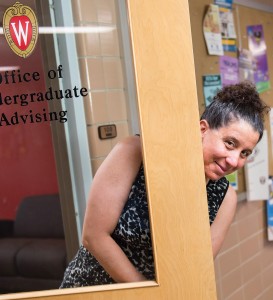Wren Singer
Advising the advisers to help students think bigger.

Wren Singer is on the lookout for students in need of advice. The Office of Undergraduate Advising aims to give better service. Photo: Jeff Miller.
For many years, Badgers have gotten bad advice. Or at least that’s been the perception among undergraduates, who have consistently rated their satisfaction with UW advising services lower than their counterparts at comparable universities.
In 2011, the Office of Undergraduate Advising (OUA) was established to make some changes and serve as a centralized hub of resources for advisers across campus. Next year, the athletic department will donate the proceeds from the 2015 Wisconsin spring football game to those efforts.
Among her many initiatives as the office’s director, Wren Singer ’93, MS’95, PhD’01 is pushing for simplified registration and course enrollment technologies. Why? She hopes advisers can shift from “transactions” with students about degree requirements to more holistic conversations. On Wisconsin talked with Singer about her vision of campus advisers becoming so much more than the folks who hand out major-declaration forms.
What’s your ideal scenario in terms of how students make use of advisers?
I want people to leave the university with their adviser as their main letter of reference, friend, and confidant, to look back and say, “If it hadn’t been for this person, I wouldn’t have gotten as much out of my education.” We need students to understand that in order to be successful when they graduate from college, they need to put together a package of experiences that includes courses and academic work, jobs and internships, and leadership and study abroad — all of these different things.
That’s why you come to a big university like this, to have these experiences. And the adviser is the person who helps you work through all that, and someone you can talk to when you’re freaking out [because] your parents want you to be an engineer and you don’t, or your parents want you to be an artist and you want to be an engineer. And we’re a ways away from that in a lot of ways, but I think we now have the tools and the organizational structure to be able to get there.
Do students have expectations about advisers that are different from what their older siblings or parents had?
I’m not sure they are thinking about [advisers] differently, and they need to, because what they need to accomplish in college is so much more than what it used to be. A really long time ago, you just graduated and got a job. The university didn’t have any particular responsibility to make sure that happened, because it just happened. But students now need [to do] a lot more during their college experience to be marketable and qualified for jobs and graduate school. Universities are under more and more pressure to deliver students into careers in ways that ten, twenty years ago were more the employers’ responsibility.
Many of our readers are parents of current UW students. What advice would you give them about helping their children navigate campus resources?
Right now, students get a lot of advice [about selecting a major and specific courses] from their parents, which is not being countered or supported by professionally prepared staff who understand the whole picture.
If you’ve gone to school here yourself and now your children are going here, you can’t do their academic advising, because things have changed. It’s very dangerous when parents start getting involved and saying, “Here’s what you should take and what you shouldn’t take,” because they can be flat-out wrong. So they need to be willing to trust the professionals who are aware of the current rules.
What do you wish your college adviser had told you?
I never went to see a college adviser. I remember saying to myself, “Well, what do I need an adviser for? I can figure this out.” What I missed was the fact that English wasn’t the right major for me. If I had had a conversation with someone who could point out that I had As in all my other classes and Bs in all my English classes, that someone could have said to me, “What’s going on with that? Is this really a good major for you?” And I would have said, “No, I can’t stand it.” But I didn’t think that was something I could talk to someone about. I was embarrassed to ask for help.
You could ask any alum that question, and they’d have something to say about it. They’d say they wished they’d had this, that, or the other thing. And now we’re trying, for their children, to do [advising] differently.
Interview conducted and edited by Sandra Knisely ’09, MA’13
Published in the Fall 2014 issue



Comments
Karen Steinle November 13, 2014
I do sincerely hope advising is different than it was in ”75-’81. I graduated in ’81 and have harbored ill feelings against the UW for all these years for not getting the support I needed. I feel extremely let down and feel that the life I might have lived didn’t happen partly because of the UW’s negligence to support me. I graduated with a French degree I never used. I was the 2nd kid to go to college in my family and both my sister and I graduated with unusable degrees and my parents couldn’t help at all with advice because they had no experiences to share with us. We all felt very let down. Thanks for trying to improve the system and turn this Titanic around in the area of advising 🙂
C November 13, 2014
Definitely agree! Needs to be improved gravely. Advisers were discouraging, to say the least. Weren’t really helpful. Waste of time going to see them. Only one or two advisers kind of helpful. BUT that was after going through several bad experiences. Very big let down. ’75 to ’81 until now, hopefully it DOES change.
Sharon Pittman November 13, 2014
I agree that a good advisor will ask you to reconsider your major if you are not doing well in your selected major, or will warn you that you may not do well if you have registered for too many difficult courses that semester. I do feel, however, that as students we are responsible for insuring that we have chosen a major that will insure a career after we graduate and to take advantage of the resources at L&S Career Services. To insure my success, I saw my advisor and then went home and opened the ugrad catalog to confirm the course selection or advising they gave.
Grothendieck November 13, 2014
If you need somebody else to tell you what your major should be, you’re doing something wrong. Very wrong.
The real issue is that more people are paying to “have fun” than to learn. This is why you’ll often meet “biology majors” that do not understand the difference between an experimental science and a theoretical one, “psychology majors” that cite statements from their textbooks as facts rather than derivations subject to interpretation, ….
Instead of blaming the adviser, blame yourself for not having the trivial level of intellectual curiosity necessary to understand the bounds of your discipline.
“You can lead a horse to water, but you can’t make it drink”